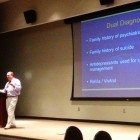
Of Organ Donors and Social Media
|
No one really questions how effective social media can be these days. Just look back across the wreckage of any number of despotic regimes in the Arab World or the 70 million plus views of a YouTube posting that may help lead to the downfall of a particularly brutal madman in central Africa and the Invisible Children at his mercy. Nor do you have to look afar for the good it can do, and in rapid fashion. For the several hundred friends and acquaintances of 19-year-old Richard Bland, a scheduled visit by a gang of four young men from the now-cancelled MTV series The Buried Life was used to jazz up a little interest in the importance of organ donations and specifically young Richard’s need for a kidney. The idea to engineer the mash up of social media and the visit by the Buried Life crew to Kennesaw State University north of Atlanta, sprang to life in the minds of some fraternity boys on a recent evening.








